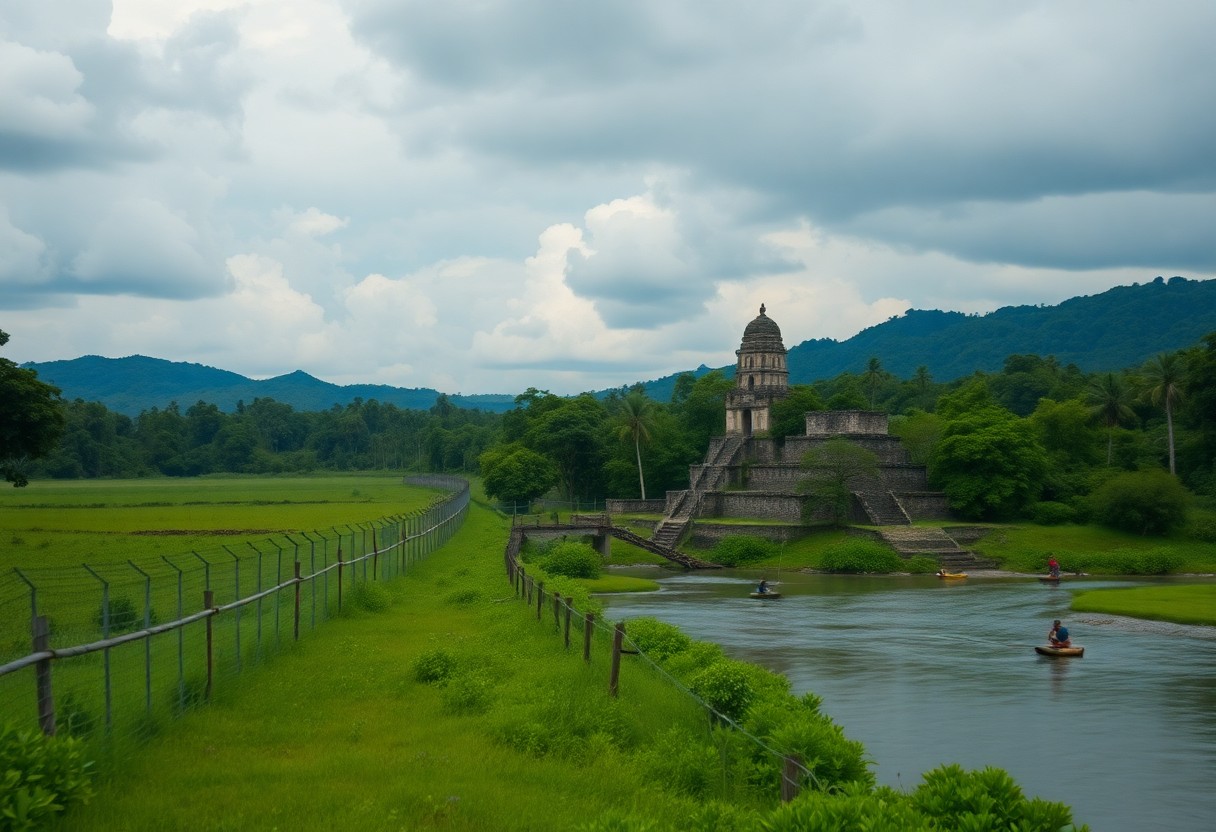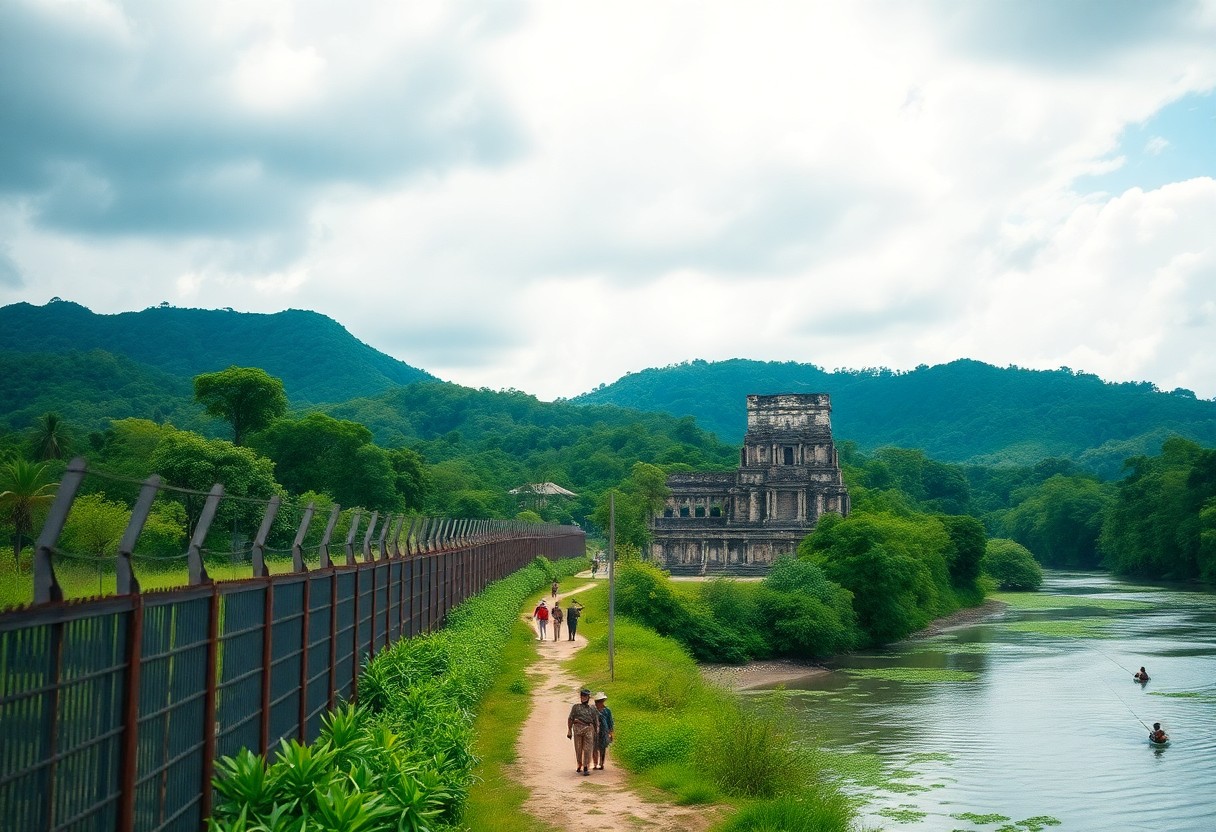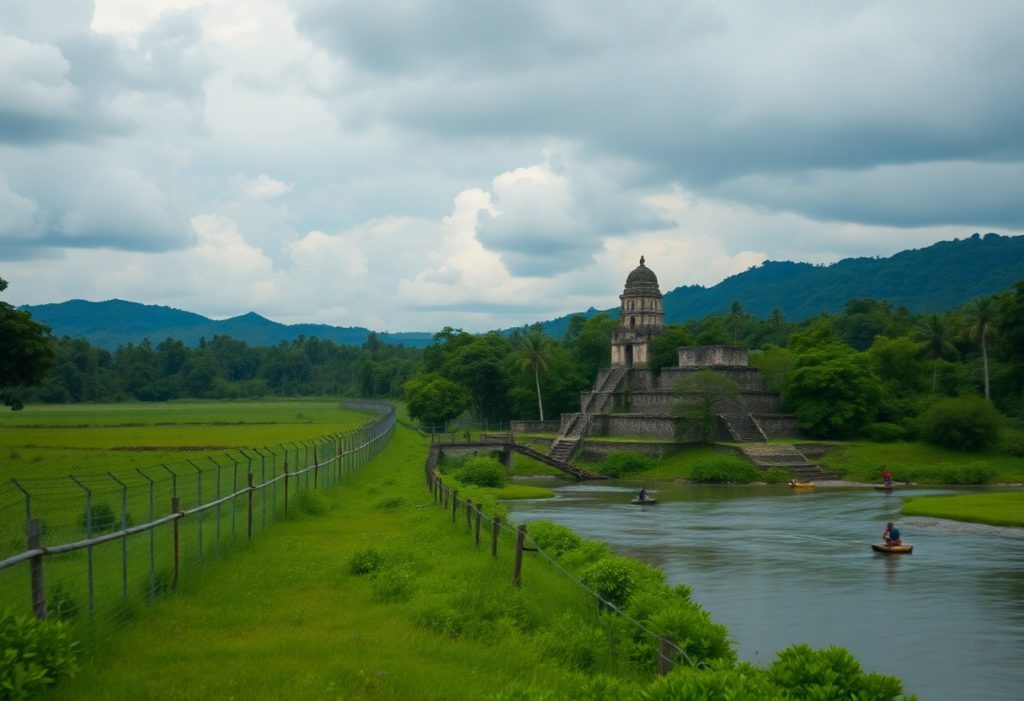The Belize-Guatemala border conflict is a prolonged and intricate territorial dispute that has developed over centuries, revealing deep-seated layers of geopolitical tension and historical animosities. This ongoing territorial dispute, rooted in colonial-era claims, presents a significant challenge to regional stability, as Guatemala has consistently disputed Belize’s sovereignty since Belize gained independence. In contrast to decades marked by diplomatic friction, recent developments have ignited a spark of hope for a peaceful resolution. A groundbreaking referendum held in 2019 witnessed citizens from both nations voting to resolve their differences through the International Court of Justice, marking a critical milestone toward reconciliation. To fully grasp the broader geopolitical dynamics within Central America, it is essential to explore the complex history of this border conflict.

Understanding the Historical Roots of the Belize-Guatemala Dispute
The origins of the territorial dispute between Belize and Guatemala are intricately linked to colonial-era territorial claims. These claims arose during the period of Spanish imperial ambitions and British colonial expansion in Central America. The initial conflict emerged from the competing interests of various European powers, with both Belize and Guatemala asserting their rights over strategically significant territories. The unresolved boundary issues have transformed into a persistent source of tension, mirroring the complex historical dynamics surrounding territorial sovereignty in the region. The legacy of colonialism continues to cast a long shadow on contemporary political relations, illustrating how historical grievances can profoundly influence modern diplomatic interactions.
Evaluating the Impact of the 1859 Boundary Treaty on Territorial Disputes
In the context of imperial negotiations, the 1859 Boundary Treaty between Britain and Guatemala aimed to clarify territorial borders. However, instead of resolving conflicts, this treaty inadvertently complicated matters further due to its vague language and the diverse interpretations that arose from it. The intricacies surrounding the treaty have evolved into a significant source of ongoing territorial disputes between Belize and Guatemala. This scenario highlights the enduring repercussions of colonial agreements on contemporary conflicts, as both nations continue to grapple with the challenging implications of historical treaties.
Analyzing the Historical Context of Territorial Negotiations
The evolution from Spanish colonial dominance to contemporary nationhood unveils a complicated landscape of territorial negotiations. The geopolitical dynamics of the area have been significantly shaped by imperial rivalries and the fluctuating borders of colonial territories, establishing a foundation for future conflicts. These boundary disputes reflect deeper narratives related to colonial legacies and postcolonial territorial challenges. The strategic importance of the territory has historically fueled conflicts, with Guatemala consistently contesting Belize’s sovereignty. This multifaceted dispute encompasses issues of historical interpretation, indigenous rights, and territorial integrity, making it a complex international controversy that continues to impact diplomatic relations between both nations.
Identifying the Central Issues of the Belize-Guatemala Border Dispute
The intricate border dispute between Belize and Guatemala includes a variety of historical, territorial, and political dimensions. The key tensions arise from competing claims over land and sovereignty, as well as differing interpretations of history itself. Deeply rooted in colonial boundaries, this conflict has been perpetuated by international legal disputes and persistent nationalist sentiments, presenting significant challenges within the diplomatic landscape for both countries. Gaining insight into these core issues is crucial for addressing the complexities of the dispute and paving the way for a resolution that respects the interests and rights of both nations involved.
Examining Guatemala’s Claims to Territorial Sovereignty
At the core of the dispute, Guatemala asserts claims to approximately 12,000 square kilometers of Belizean territory, arguing that their historical rights are derived from Spanish colonial boundaries. This assertion poses a direct challenge to the legitimacy of British territorial acquisitions, focusing on varying interpretations of historical treaties and colonial agreements that Guatemala contends were unjustly imposed upon them. This claim illustrates Guatemala’s ongoing efforts to reclaim what it perceives as ancestral land, underscoring the deep-rooted grievances that drive the conflict. This situation highlights the necessity for a nuanced approach to conflict resolution that acknowledges the intricacies of historical narratives.
Belize’s Assertive Defense of Its Territorial Integrity
The discussions surrounding Belizean sovereignty underscore the nation’s unwavering right to self-determination and the safeguarding of its territorial integrity. Belize firmly upholds its independence, categorically rejecting Guatemala’s territorial claims while emphasizing the significance of international recognition and the legal principle of uti possidetis juris. This principle asserts that established colonial boundaries should be honored following independence. Further examination reveals that Belize’s sovereignty is bolstered by international law and numerous resolutions from the United Nations. The nation has actively defended its territorial integrity through diplomatic avenues, rallying international support to fortify its borders. Additionally, mechanisms for peaceful resolution, including international mediation, have become vital strategies in addressing this long-standing conflict.

Evaluating Diplomatic Initiatives for Conflict Resolution
The ongoing efforts to resolve the protracted border conflict between Belize and Guatemala have involved various international mechanisms and diplomatic negotiations. Both nations have acknowledged the potential risks linked to prolonged territorial tensions, motivating them to pursue peaceful solutions through diplomatic channels. International mediation and bilateral discussions have played a critical role in gradually easing historical animosities and creating pathways toward resolution. Understanding these diplomatic initiatives illuminates the progress made and the challenges that persist in achieving lasting peace.
Insights into Current Diplomatic Negotiations
The diplomatic negotiations between Belize and Guatemala have been characterized by gradual progress and strategic dialogue aimed at fostering mutual understanding. These discussions have focused on exploring potential compromise solutions that could satisfy the interests of both nations. Key diplomatic initiatives have included high-level meetings, the establishment of bilateral commissions, and international facilitation, all designed to address territorial claims while promoting regional stability. This ongoing dialogue emphasizes the importance of diplomatic engagement in resolving complex geopolitical issues.
Assessing the Role of the International Court of Justice in Mediation
The International Court of Justice (ICJ) plays a pivotal role in mediating the border dispute between Belize and Guatemala. The ICJ serves as a neutral legal platform for addressing territorial claims, providing an internationally recognized mechanism for dispute resolution that could potentially conclude decades of territorial tensions. The court’s involvement represents more than mere arbitration; it signifies a critical inflection point in the relations between Belize and Guatemala. By committing to submit their dispute to the ICJ, both countries have displayed their commitment to pursuing a peaceful resolution. The court’s forthcoming ruling could decisively clarify territorial boundaries, potentially establishing a permanent legal framework for future bilateral relations and enhancing regional stability.

Understanding the Effects on Travel and Trade Relations
Navigating the complex Belize-Guatemala border necessitates a thorough understanding of its multifaceted challenges. The historical territorial disputes have significant implications on cross-border interactions, influencing unique travel and economic dynamics. The ongoing tensions have affected transportation routes, trade patterns, and the overall diplomatic relations between these neighboring countries. The border region requires careful consideration of geopolitical sensitivities that could impact movement and economic exchanges, making it essential for travelers to remain well-informed and prepared.
Current Travel Guidelines for Ensuring Safety and Preparedness
Traveling along the Belize-Guatemala border demands exercising heightened caution. Ensuring your safety relies on staying informed about current diplomatic conditions and potential conflict zones. Official travel advisories recommend consulting government websites prior to crossing, verifying necessary documentation, and maintaining awareness of local security situations. Careful planning of your route, including the use of officially sanctioned border crossing points, can significantly minimize risks and enhance your travel experience in this sensitive region.
Examining Cross-Border Trade Dynamics and Economic Interactions
The trade relations at the Belize-Guatemala border remain intricate and continuously changing. Despite historical tensions, agricultural products and small-scale commercial exchanges continue to flourish, reflecting the economic interdependence that exists between these two nations. To fully understand these interactions, one must acknowledge the resilience of economic relationships that endure despite political challenges. The trade landscape reveals a complex web of activities, where agricultural commodities such as sugar, citrus, and timber play significant roles in cross-border exchanges. Informal trade networks, facilitated by local merchants, navigate the diplomatic complexities, illustrating how economic cooperation can persist amidst territorial disputes. Ongoing bilateral agreements and diplomatic negotiations further shape these economic interactions, offering promising prospects for future collaboration and mutual benefits.
Investigating the Socio-Political Consequences of the Dispute
The border dispute between Belize and Guatemala extends beyond mere geographical boundaries, embodying significant socio-political implications for both nations. This territorial conflict has a profound impact on diplomatic relations, national security strategies, and the broader regional dynamics. The ongoing tensions create complex socio-political challenges that influence governmental strategies, international negotiations, and the daily lives of citizens in both countries. Understanding these implications is essential for grasping the broader effects of the dispute on the region as a whole.
Examining National Identity and Public Sentiment Regarding the Dispute
The border dispute resonates deeply with national pride and historical narratives in both Belize and Guatemala. Each country perceives the territorial claims as a matter of fundamental sovereignty, leading to passionate public discourse and political sentiment. This conflict has evolved into a symbol of national identity, as citizens fervently defend their historical perspectives and territorial integrity. The emotional weight of these claims shapes public opinion, influencing political discourse and national policy, thereby highlighting the intricate relationship between territorial disputes and national identity.
Assessing Regional Stability and Security Challenges Arising from the Dispute
The ongoing border dispute presents potential vulnerabilities in regional peace and cooperation. Unresolved territorial claims generate diplomatic tensions that could destabilize bilateral relationships and affect broader regional security dynamics. Recognizing these challenges is crucial for understanding the complex geopolitical landscape of Central America. The dispute represents more than just a territorial disagreement; it threatens regional stability through the risk of military escalations. The persistent tension complicates economic collaboration, cross-border trade, and cooperative security efforts. Awareness of these dynamics elucidates how unresolved territorial claims can undermine diplomatic progress and create long-term challenges for peaceful coexistence between Belize and Guatemala.
Envisioning Future Diplomatic Pathways for Resolution
Despite the complex historical tensions, the situation along the Belize-Guatemala border highlights potential pathways for diplomatic resolution. Ongoing negotiations and international mediation offer promise for achieving a peaceful settlement. The international community continues to support constructive dialogue between both nations, indicating that a comprehensive resolution may be within reach in the foreseeable future. The commitment to diplomacy signifies a crucial step toward addressing enduring grievances and fostering a more stable future for both nations involved.
Identifying Practical Resolutions to the Ongoing Dispute
Potential resolutions to the enduring territorial dispute could include international arbitration or a mutually agreed-upon territorial compromise. The recent willingness of both countries to engage in diplomatic discussions suggests that a mutually beneficial agreement may soon be achieved. The involvement of neutral international bodies could provide a structured framework for resolving historical claims, paving the way for more effective conflict resolution strategies moving forward.
The Influence of International Relations on Border Negotiations
International relations significantly influence the border negotiations between Belize and Guatemala. Diplomatic channels have emerged as essential instruments for managing territorial tensions and promoting dialogue. Regional organizations and global diplomatic platforms play crucial roles in facilitating discussions and seeking peaceful resolutions. Moreover, the broader geopolitical context profoundly affects these border relations, as international pressure and diplomatic engagement create opportunities for resolution. The potential for economic cooperation, joint development initiatives, and shared security interests offers promising avenues for collaboration. Organizations like the OAS have been instrumental in mediating discussions and fostering peaceful interactions between the two nations.
Addressing Frequently Asked Questions About the Belize-Guatemala Territorial Dispute
What historical events led to the territorial dispute between Belize and Guatemala?
The territorial dispute traces its roots to Spanish colonial claims and British settlements in the region during the 19th century. Initially, Spain asserted claims over the territory; however, Britain established settlements in Belize, leading to intricate legal and territorial challenges. The conflict revolves around competing territorial assertions, with Guatemala maintaining claims to the majority of Belize’s land following Central American independence in 1821.
How has the international community aided in resolving the long-standing border conflict?
The Organization of American States (OAS) has played a significant role in mediating this dispute. In 2008, both countries agreed to present the matter to the International Court of Justice (ICJ) for a binding resolution. A referendum held in both Belize and Guatemala during 2018-2019 demonstrated public support for international judicial intervention, ultimately paving the way for a peaceful resolution mechanism.
What is the current status of the agreement regarding the Belize-Guatemala border?
In May 2019, the ICJ issued a definitive ruling on the territorial dispute, largely affirming Belize’s sovereignty while making minor adjustments to the border demarcation. The ruling granted Belize approximately 12,272 square kilometers of territory, providing a clear legal framework for future diplomatic relations and establishing permanent maritime and land boundaries between the two nations.
The Article The Belize-Guatemala Border: History, Conflict, and Current Status appeared first on Belize Travel Guide
The Article Belize-Guatemala Border: Historical Conflicts and Current Status Was Found On https://limitsofstrategy.com
References:
Belize-Guatemala Border: Historical Conflicts and Current Status


